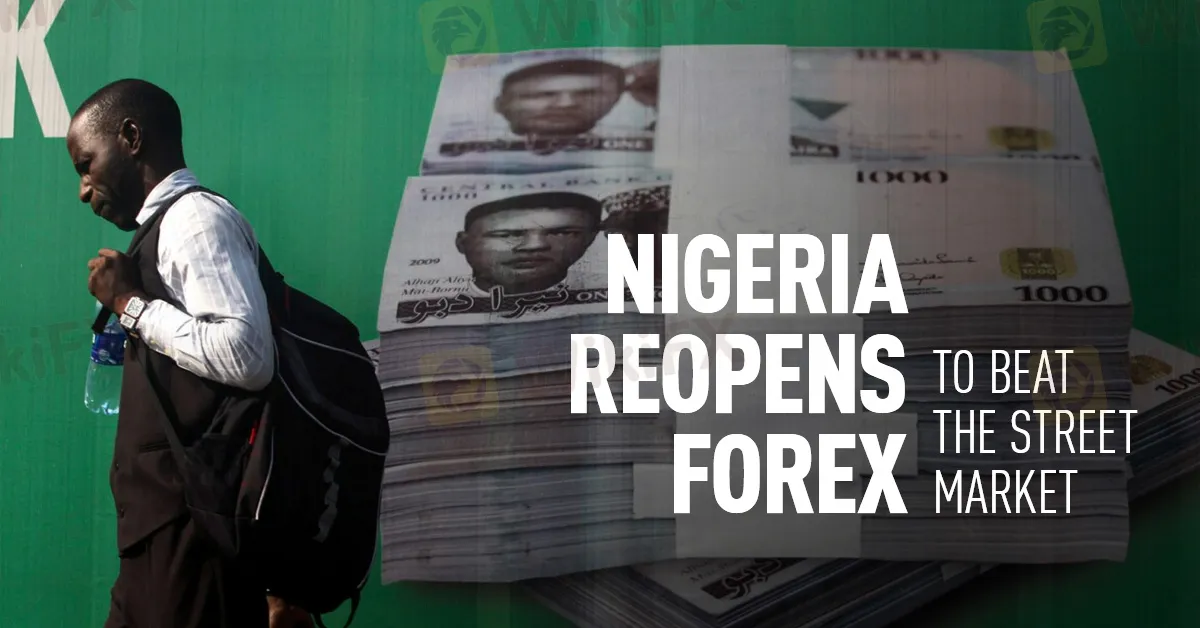简体中文
繁體中文
English
Pусский
日本語
ภาษาไทย
Tiếng Việt
Bahasa Indonesia
Español
हिन्दी
Filippiiniläinen
Français
Deutsch
Português
Türkçe
한국어
العربية
NIGERIA REOPENS FOREX TO BEAT THE STREET MARKET
Abstract:Bureaus de change are permitted to publish naira rates in public. A move to harmonize rates is observed to be enhancing price discovery.

· Bureaus de change are permitted to publish naira rates in public.
· A move to harmonize rates is observed to be enhancing price discovery.
Nigeria's most recent move to close the gap between the official and unofficial rates of its naira currency is to reintroduce FX trading to the public.
The Association of Bureaux de Change Operators of Nigeria has been authorized by the nation's watchdog on financial crimes to openly publish the naira's purchasing and selling rates against the US dollar on the internet.
The group's president, Aminu Gwadabe, stated that the action is “to enhance competitiveness and price discovery in the market and challenge the parallel market.”
In an attempt to support the official naira, the previous central bank leadership had controlled bureaux de change and limited the visibility of the unofficial market. This move has reversed those actions. That action merely forced activity into the shadows and onto the street.
As part of to unite the two markets and abandon a regulated exchange rate, the most populous country in Africa has made the naira rates widely available online.
Unsettling Journey
Weeks after newly elected President Bola Tinubu took office in late May, the nation's long-standing currency system began to be eased in an effort to draw in international investment. But so far, it's been rocky.
Since the reforms were announced in June, the naira has lost roughly half of its value versus the dollar, and the local currency scarcity has caused the disparity between the two markets, which briefly converged, to expand.
Naira depreciates against the dollar in parallel markets, driven by a surge in demand for US dollars.
Many currency dealers work on the streets, and the Economic and Financial Crimes Commission has targeted them, accusing them of money laundering and manipulation.
In September, the central bank also issued a warning to foreign exchange dealers: cease betting against the naira or risk penalties.
Greater Issue
They are but a small portion of a larger issue.
Large-scale dollar seekers, such as foreign businesses that must repatriate naira earnings, obtain US dollars at the official exchange rate from the central bank.
The central bank is working to alleviate demand caused by the official market, but there is still a long way to go. On January 17, Bloomberg Television heard Finance Minister Wale Edun estimate the backlog to be around $5 billion.
The naira pressure these measures. On Tuesday, it was valued at a record low of 1,365 naira per dollar on the illegal market, which was more than 30% more than the official rate.
Furthermore, it's unclear if the prices that will publish will be those that street dealers—who are also licensed operators—have already compiled.
Forex bureaus can trade in the currency was regulated by the central bank in September at a range of plus or minus 2.5% of the official market-weighted average from the day before.
It accused the operators of distorting the prices and suspended both the bureaux de change's own online portal and another that published rates from the parallel market in 2021.
According to Gwadabe, the bureaux will now be “upscaling” in order to challenge the other platforms in the economy.

Disclaimer:
The views in this article only represent the author's personal views, and do not constitute investment advice on this platform. This platform does not guarantee the accuracy, completeness and timeliness of the information in the article, and will not be liable for any loss caused by the use of or reliance on the information in the article.
Read more

The Ultimate Guide to Automated Forex Trading in 2025
Modern markets are revolutionized by automated trading systems, which now execute 70-85% of all transactions. These advanced automated trading software solutions, commonly called trading robots or Expert Advisors (EAs), leverage algorithmic precision for automatic trading across forex, stocks, and commodities 24/7. By removing emotional interference and executing trades in microseconds, auto forex trading platforms create fair opportunities for all market participants. For those new to automated trading for beginners, these systems provide disciplined, backtested strategies while significantly reducing manual effort.

How Reliable Are AI Forex Trading Signals From Regulated Brokers?
Discover how reliable AI Forex trading signals are and why using a regulated broker boosts their effectiveness. Learn key factors to evaluate accuracy and enhance your trading.

Top Currency Pairs to Watch for Profit This Week - March 31, 2025
Discover the top 5 currency pairs to trade for profit this week, March 31, 2025—USD/JPY, EUR/USD, GBP/USD, AUD/USD, USD/CHF—with simple strategies and best times.

AI-Powered Strategies to Improve Profits in Forex Trading
Boost Forex profits with AI: predictive analytics, real-time automation, and smart risk management strategies for sharper trades and fewer losses.
WikiFX Broker
Latest News
How Crypto Trading Transforms FX and CFD Brokerage Industry
UK would not hesitate to retaliate against US tariffs - No 10 sources
FCA Warns Against 10 Unlicensed or Clone Firms
CySEC Warns Against 14 Unlicensed Investment Websites
Top Currency Pairs to Watch for Profit This Week - March 31, 2025
Will natural disasters have an impact on the forex market?
Philippines Deports 29 Indonesians Linked to Online Scam Syndicate in Manila
Navigating the Intersection of Forex Markets, AI Technology, and Fintech
Exposed: Deceptive World of Fake Trading Gurus – Don’t Get Fooled!
AI-Powered Strategies to Improve Profits in Forex Trading
Currency Calculator







